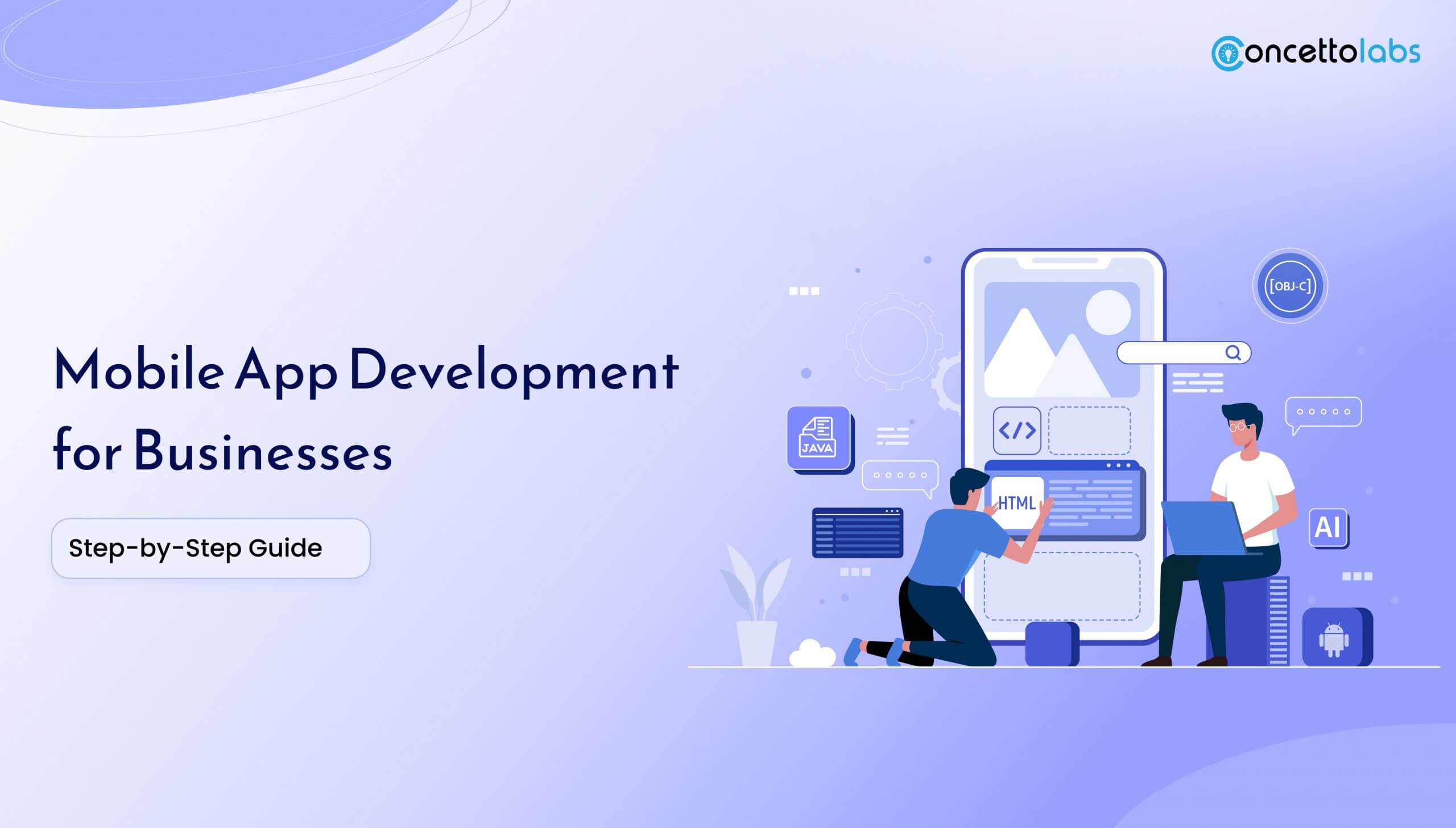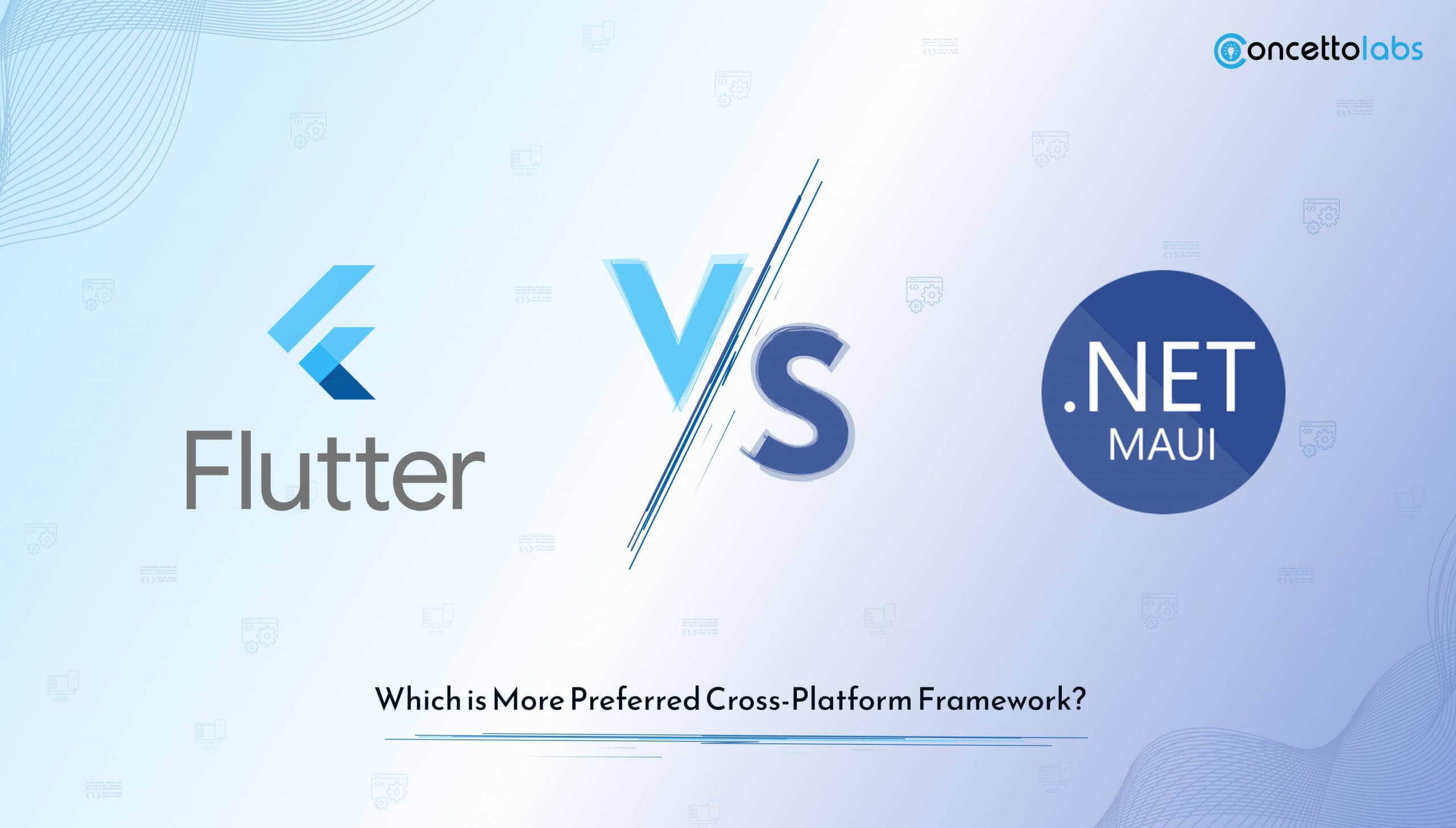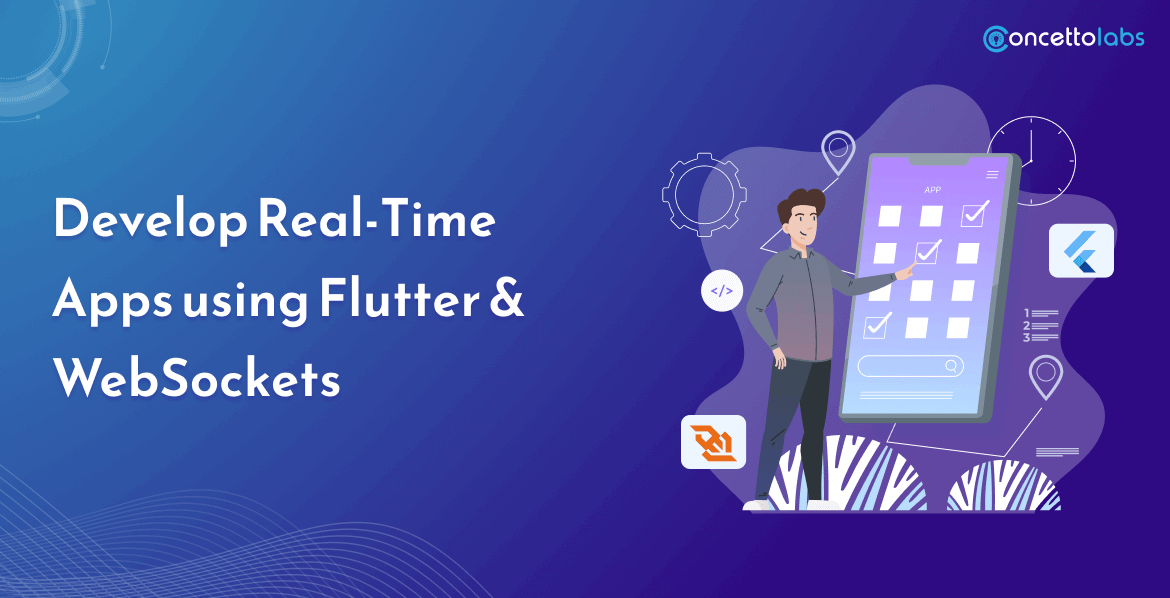
Summary: Experts at Concetto Labs have carefully examined user data, industry trends, and framework features before compiling a list of the top mobile app development frameworks for 2024 that are well-liked by clients and developers alike. Our list of the best cross-platform mobile app development frameworks and their salient characteristics is all you need if you are trying to decide which one would work best for you.
Cross-platform mobile application development is the main source of mobile app development. With a cross-platform, or multiplatform, strategy developers can design applications that function consistently across several mobile devices.
Looking at its expansion, several cross-platform app development frameworks and tools started to operate in the market, and then every mobile app development company invested in this technology.
Cross-platform app development frameworks have become incredibly popular because they can shorten time-to-market and simplify the development process. These frameworks include a wide range of features and tools that streamline the development process and facilitate the creation of high-caliber apps by developers. We will examine the top ten cross-platform app development frameworks in this blog, which are transforming the process of developing mobile apps.
What is a Cross-Platform App Development Framework?
Cross-platform mobile apps function on various mobile operating systems, including Windows, iOS, and Android. As a result, you can develop apps for multiple platforms without needing to write separate code. when you use a cross-platform app development framework, you should also be aware of the distinctions between developing native apps and cross-platform apps. Additionally, selecting the appropriate app development type significantly impacts your budget.
Also, it is simple to reach a larger audience because the cross-platform is compatible with several systems. With all the advantages, it is one of the most often used app development techniques for businesses and startups trying to efficiently tackle the difficulties of developing mobile applications.
Now, let us explore the best cross-platform app development frameworks that the developers widely prefer. But before that, it is also important to know the difference between cross-platform app development and native app development.
What is the Difference Between Native vs Cross-Platform App Development?
The technologies used for native and cross-platform development are always changing. Because technology is constantly evolving, it is necessary to periodically review these subjects to identify the solutions that are now dominating the market, instead of focusing on the intricacy of developing a product that spans several platforms, native app development concentrates on producing a skillful design that remains close to the target platforms that is iOS, Android, etc.
Cross-platform frameworks encompass a wide range of end devices in the development and creation process to provide an app that reaches out to as many brand followers as feasible.
| Factor | Native Apps | Cross-Platform Apps |
| Cost | Highly expensive | Low-cost development |
| Code Usability | Works for a single platform | Single code can be used on various platforms for easy portability |
| Device Access | Platform SDK allows device access API without any trouble | No assured access for every device API |
| UI Consistency | Consistency with the UI component device | Limited consistency using the UI components of the app device |
| Performance | Seamless performance, given the app developed for the device OS | High performance but hardware compatibility issues are not uncommon. |
| Target Audience | Limited to a particular platform | Reaches a large number of users |
| Time-To-Market | More time is required to write different code | Due to the single code base reduced time to market. |
Want to Get More Details on App Development Frameworks?
Contact our Developers!Which are the Top 5 Cross Platform App Development?

1. Flutter
In recent years, Google’s Flutter framework has become one of the most popular for developing the best cross-platform applications. Using a single codebase, developers can create native-looking apps for iOS, Android, and even website development using Flutter, which is renowned for its quick performance and expressive user interface. Its hot reload functionality allows Flutter developers to see code changes instantly, which speeds up the app development process.
Top Applications Developed with Flutter
- Xianyu by Alibaba
- Google Ads
- Google Pay
- Realtor.com
- Tencent
Advantages of Using Flutter for Cross-Platform App Development
- Permits using the same business logic and user interface across all the platforms
- Provide comparable native application native application functionality
- Provide bespoke animations for any complicated application
- The hot reload capability makes it simple to undertake quick testing.
Pros and Cons of Flutter Framework

| Pros | Cons |
| Flutter is simple to learn and easy to develop and debug | The hot reload feature of Flutter works only with the Dart language |
| Applications developed with Flutter will not depend on any intermediate code representation | Apps developed using Flutter are around 4-10 Mb larger in size. |
| It has an active and evolving community | Flutter apps are not supported by browsers hence it is difficult to develop web apps |
| Develops applications faster and within your budget | |
| It allows sharing of both UI code and UI on every platform. |
Features of Flutter Framework
- Flutter development offers improved scalability, flexibility, and integration capabilities.
- Similar to React-Native, Flutter also has hot-reloading, which enables developers to render changes in a matter of milliseconds.
- With a vast ready-to-use library collection, the most recent version of Flutter 3.0 makes it easier for developers to create applications.
- Flutter’s automated testing tool keeps your functionality and bug-fix velocity intact while making sure the app runs properly before you publish it.
2. React Native
Another well-liked option for developing cross-platform mobile apps like Facebook Mobile Application is developed using React Native. React Native, based on the React framework, lets programmers use JavaScript and React to create native mobile apps. React Native development has a huge community and a vast ecosystem that provides a ton of libraries and tools to speed up the development process.
Top Applications Developed with React Native
- Bloomberg
- Skype
- Tesla
Advantages of Using React Native for App Development
- The iOS and Android systems share around 90% of the same code.
- Because React Native developers make use of graphics processing units, it gives us more performance than other cross-platform technology.
- React Native provides pre-developed user interface components.
- Obtain the real-time and hot reloading feature to maintain the code’s local state as it refreshes.
Pros and Cons of React Native Applications

| Pros | Cons |
| Having a fast-reloading feature, developers can analyze changes faster in comparison to native app development | Not preferred for complex user interfaces |
| It allows code sharing between platforms at a rate of 80% | It lacks consistency while releasing updates |
| Developers and companies across the world highly support this. | It takes more time to debug, especially for Android devices. |
Features of React Native Applications
- Development across platforms using a single codebase
- Development with low code for ease of use
- Interoperability with external plugins for enhanced features
- Declarative API enables better development time and is less error-prone.
- Architecture-based components for efficient updating and reusability
- Using hot reloading to see changes instantly
- Integration of native modules for peak performance
- Use the ecosystem and past community for resources and help.
3. Ionic
A dynamic open-source framework for mobile applications called Ionic connects web technologies with native web app development. It supports cross-platform mobile applications for Windows, iOS, and Android and is based on Angular and Apache Cordova. Ionic is useful for developing feature-rich, interactive applications.
For individuals wishing to learn mobile app development frameworks without mobile technology expertise, its open-source nature makes it a favored framework. Ionic developers have already developed over 450000 web apps.
Top Applications Developed Using Ionic Framework
- McDonald’s
- Pacifica
- JustWatch
- Diesel
- Honeyfi
Advantages of Using Ionic Framework
- Simple to understand
- Use online apps that are progressive.
- Angular serves as the foundation for Ionic and has strong community support.
- Reduced time for development
Pros and Cons of the Ionic Framework

| Pros | Cons |
| a single codebase across several platforms | Setting up hot reloading is difficult. |
| Tools and components with native functioning | Requires familiarity with Angular |
| Many UI elements and simple prototyping | Fixing issues and debugging |
| Compatibility with plugins and APIs from third parties | Reduced speed of operation |
4. Kotlin
JetBrains develops and supports Kotlin. With its Apache 2 license and protection under the Kotlin Foundation, Kotlin makes cross-platform development easier. The Kotlin app development framework operates on the Java Virtual Machine (JVM) and is a contemporary statically typed programming language.
Because of Kotlin’s rich features and succinct syntax, developers can leverage pre-existing Java libraries in conjunction with its interoperability with Java. Applications may operate smoothly across a range of operating systems thanks to their multi-platform characteristics.
Top Applications Developed by Kotlin
- Netflix
- Cash App
- Philips
Advantages of Kotlin App Development Framework
- Easy Maintenance
- Highly versatile and adaptable
Pros and Cons of the Kotlin Framework

| Pros | Cons |
| Applications for several platforms | Less opportunities for learning |
| Mobile apps that are secure and safe | A slower rate of compiling |
| Features of functional programming | Intricate syntax |
| Strong backing from the community |
Features of Kotlin Framework
- Completely compatible with Java
- Code awareness, which lessens boilerplate code
- Improved maintainability and readability of the code
- Integrated null safety measures Features of contemporary development such as lambda expressions
- Server-side, client-side, and iOS development are all possible with Kotlin
- Asynchronous programming support
- Integrates functional and object-oriented programming paradigms.
- Perfect for creating expressive and unambiguous test cases
5. Xamarin
Using.NET and C#Xamarin is an open-source, multi-platform mobile app framework that helps developers construct high-quality mobile applications. Xamarin allows developers to create high-performing mobile apps with native-like flexibility on both the iOS and Android platforms by utilizing a single software framework. Developers may quickly and easily integrate components, APIs, and backend with various tools, libraries, and programming languages using Xamarin.
Top Apps Developed Using Xamarin Framework
- Alaska Airlines
- The World Bank
- FreshDirect
- Insightly
Features of Xamarin App Development Framework
- The user-friendly interface provides a platform-native experience, enabling technology companies to react to any request from their clients in a particular industry.
- Because Xamarin is a one-size-fits-all program, it’s simple to navigate around the HTML resources developers and end users need.
- Developers can easily create mobile-responsive Android app development frameworks from the comfort of their workstations thanks to the smooth interaction with Visual Studio.
- Xamarin Mac makes it possible to create fully native Mac apps with C# and .NET.
- It incorporates the same Objective-C libraries used to construct Xcode.
Pros and Cons of the Xamarin Framework

| Pros | Cons |
| More than 60,000 contributions from more than 3,700 businesses make up Xamarin’s enormous community. | Restricted availability of open-source resources |
| Reusing up to 96% of the source code allows for faster engineering cycle times. | Delayed Assistance |
| Xamarin Development uses plugins and unique APIs to operate with standard devices across platforms, eliminating hardware compatibility difficulties. | Issues with Third-party library compatibility |
What are the Benefits of Using Cross-Platform App Development Frameworks?
1. Maximum Visibility to the Intended Audience
Using a multi-platform mobile development methodology enables you to create an application and distribute it across several platforms, including the Internet. This suggests that one can target both the iOS and Android platforms with a single application, thus broadening their scope.
2. Lower Development Expense
The principle of “write once, run everywhere” is the foundation for cross-platform application development. Development costs can be decreased by using tools that enable agile application development and reusable code. Thus, there may be no other option than to use multi-platform apps to enhance your company across multiple platforms and technologies in a useful way.
3. Simpler Deployment & Upkeep
It is easier to maintain and send code updates and modifications because only one built application operates on all platforms. Updates can quickly sync across all devices and platforms, saving money and time. Furthermore, a defect should only need to be repaired once if it is discovered in the main codebase. In this way, developers can save a significant amount of money and time.
4. Accelerated Process of Development
Fast development is another case where both parties benefit while developing cross-platform applications. It is possible to reduce development efforts by 50–80% by using a single source code for numerous platforms. It helps you obtain a company application with many features in less time. The team of developers is capable of meeting multi-platform application development deadlines.
5. Reusable Code
This platform’s ability to reuse the code repeatedly is another advantage. Developers can reuse a single code instead of writing new ones for every platform. Because it eliminates duplication in the process of creating codes, this saves time and resources.
6. Simple Integration with Cloud
Cross-platform mobile apps can take advantage of various plugins integrated into the cloud settings and are fully compatible with each other. Put differently, many plugins and extensions are incorporated into the single source code to enhance the application’s functionality and scalability.
Choosing the Appropriate Cross-Platform App Development Framework
We have discussed the top 5 cross-platform app development frameworks in this blog. That being said, many alternative cross-platform frameworks are available, and more to come. How to pick the ideal one for your company is the current query. You must reflect on your needs as a business, your goals for application development, and your understanding of these things. While there are many things to take into account, the following are the most important ones:
- An objective you wish to fulfill
- The company’s size
- The skill level of the developers you hire
When choosing the best match for your enterprise solutions, you need to consider these things. Ionic is the greatest option, for instance, if you are a startup or small firm looking for merely basic applications for your enterprise. Large, well-established companies seeking reliable solutions can consider Xamarin, Sencha, and similar products.
Final Thoughts
Cross-platform app development broadens your company’s customer base. Nowadays, with more people using smartphones, most businesses seek to stay competitive by creating mobile versions of their websites. You must construct a single application that works on iOS and Android to use the multiplatform app development approach.
You need to assemble an outstanding team of skilled developers and designers to create incredibly robust applications that will propel your organization to new heights. One of the top companies for cross-platform app development is Concetto Labs. Our cross-platform development services cover a broad spectrum, including strategies, development, support, and upkeep.










 Indonesia
Indonesia
 Botswana
Botswana
 USA
USA
 Italy
Italy
 Panama
Panama



 USA
USA UK
UK Saudi Arabia
Saudi Arabia Norway
Norway India
India Australia
Australia